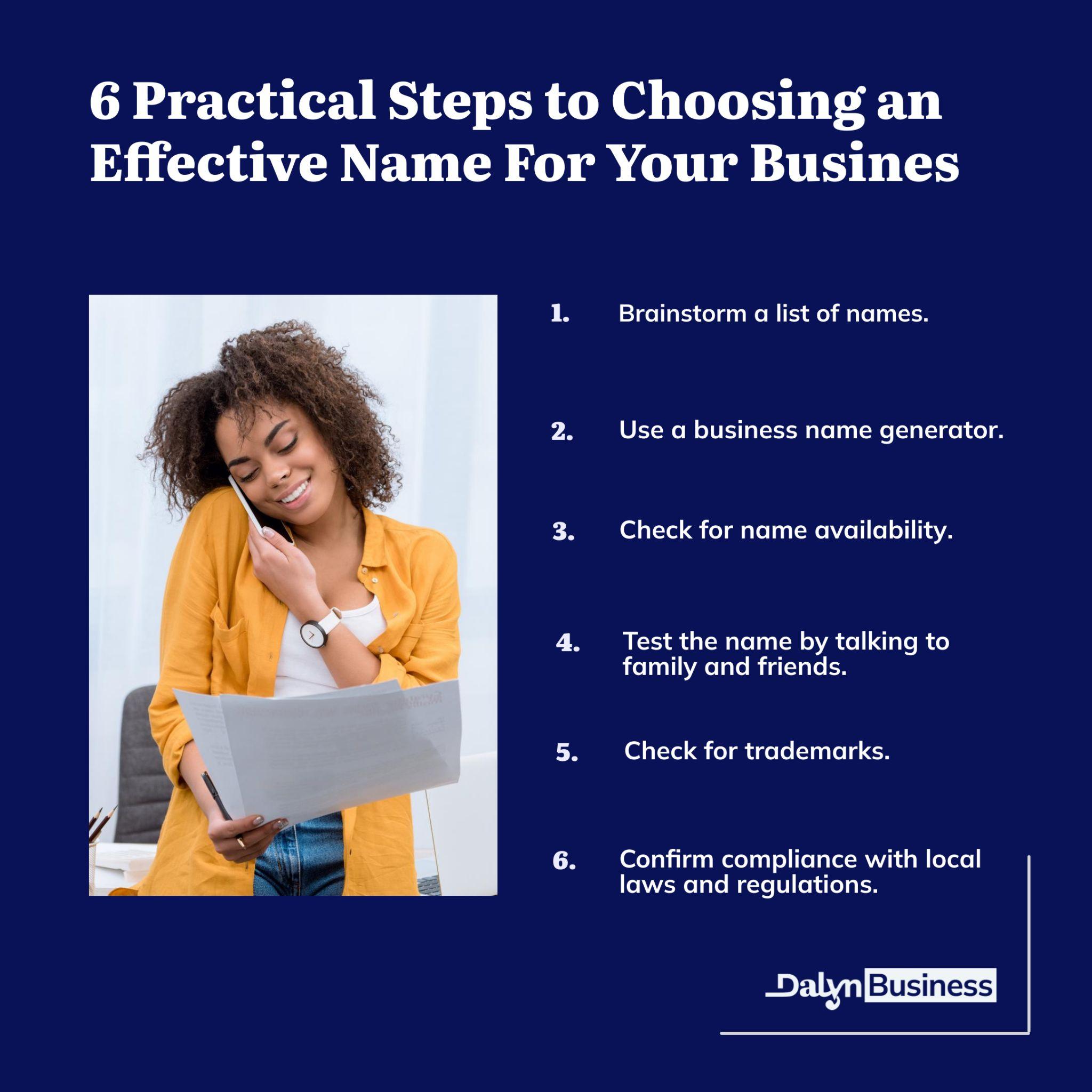Are you struggling or stuck trying to choose the perfect name for your business? As an aspiring business owner, choosing a business name is one of the most essential decisions you must make while starting out.
Your major challenge may be harmonising ideas to come up with the perfect business name. The list of ideas may go this way: a name that is memorable, easy to pronounce, tells what your business is about, differentiates your business from competitors, and can accommodate possible future products/services expansion.
You may have come up with some business names only to discover that someone else has taken them. Either they have created websites and social media accounts with the names, or they have registered them with the Corporate Affairs Commission (CAC). To avoid legal issues, you go back to choose another name. When this becomes repetitive, it can be frustrating and time-consuming.
Whether you have attempted to choose a business or you haven’t even tried, choosing a business name shouldn’t be challenging if you understand the steps and best practices to follow. In this article, we’ll walk you through 6 practical steps to choosing an effective name for your business. They include:
1. Brainstorming a list of names
2. Using a business name generator
3. Checking for name availability
4. Testing the name by talking to family and friends
5. Checking for trademarks
6. Confirming compliance with local laws and regulations.
At the end of this article, you’ll learn how to choose a business name that both you and your prospective customers will love.

What is a business name?
A business name is an official name a company or organisation uses to operate and carry out businesses. Simply put, a business name is a name that customers and the public use to identify and distinguish your business from other businesses.
But that’s not all.
One of the main ingredients of a business name is that it is legally recognised. That is, it is registered with the appropriate government authority of a country. In Nigeria, the Corporate Affairs Commission (CAC) is responsible for registering a business name. In 2022, CAC registered over 220,000 business names.
Why you need to choose the right business name
You need to understand that not every name is right for your business. In 2018, MATEC Web of Conferences conducted a study that shows that investors are more likely to invest in a business whose name is short, fluent, easy to identify, and contains good moral meaning.
Other reasons why you should choose the right name for your business include:
- To encourage memorability: Think of the times you had to recall a business name you wanted to tell a friend about. How easy was it? A memorable business name is easy to recall. For example, a business name like JA Agro is easier to remember than Jonathan Adewale and Sons Agricultural Ventures.
- To create room for growth and scalability: Some business names can be limiting. When your business name is too specific, you might not be able to start other ideas under it. For example, a business name like KamNelly Wigs tells a customer that this is a business dealing in wigs alone. Imagine that you’re the owner of this business, and you want to diversify into selling makeup kits, shoes, and clothes in the future. It becomes a bad idea to maintain that business name since customers may think your business is all about wigs. Assuming you had chosen a name like KamNelly Women Wears, that would have been a great name to accommodate your business expansion. But if you’re certain of dealing in wigs alone, the business name KamNelly Wigs works fine.

- To make your business distinct: A unique business name is like a fingerprint. It is distinct and always points back to a specific owner. The right business name sets you apart from your competitors. For example, a business name like Dinma Writes shows that Dinma owns this business, and it offers writing services.
- To brand and create an identity for your business: Your business name helps you create an unforgettable identity for your customers and clients. The right name can also suggest your brand’s values. For example, a name like Swift Pickup creates a first impression of a fast pickup service.
- To avoid legal issues: A name already registered and trademarked by another business is the wrong name to choose. Choosing this kind of name knowingly or unknowingly can run you into legal problems. In 2022, Oga Sabinus, a comedian, threatened to sue UAC Food and Peak Milk demanding the sum of N1bn for using his trademarks for marketing. You can now see how serious trademark infringement can be. That’s why you should go for a trademark availability check before finalising your business name. We’ll show you how to do that soon.
How to choose the right name for your business in Nigeria: 6 steps to take
Now that we have shown why you need to choose the right business name, we’ll walk you through the steps to choosing the right name. Let’s get to it.
1. Brainstorm a list of names
Brainstorming is a mental activity that helps you come up with ideas. While brainstorming, don’t be selective of the business name ideas coming to you. So, just write down the good and not-so-good ideas as they come. At a later stage, you can then pick out the best names.
Here are 4 important reasons why you should brainstorm a list of names:
- Brainstorming helps you explore, compare, evaluate, play with words, and come up with various name combinations.
- It sparks your creativity to think in various directions and generate different names you never imagined possible.
- It helps you have business name options in case you check the availability of your chosen name and someone else has taken it.
To brainstorm a business name, the following factors should guide and inspire you.
- Business values: Business values are qualities that are dear and matter most to your business. Take some time to think about your business values. Your business values can be great customer service, accountability, excellence, gender inclusion, etc. For example, Royal Stallion is a business name for popular rice in Nigeria that signifies the values of durability and quality.
- Mission: Your business mission is the impact you want to make with your business. It is the fundamental reason you’re in the business. Assuming a business answers the name, Swift Pickup, it could be that its mission is to make sure people get orders delivered exactly when they need them.
- Your industry and expertise: This is where you consider what your business specialises in, what it can offer, and which area of life it focuses on. For example, the business name, Glorious Restaurant, immediately gives you an idea of the industry and the experience it can offer with its meals.
With these factors in mind, you’ll be able to brainstorm business names that align with your overall and long-term goals.

Here are 5 steps to brainstorm a list of business names:
- Get a notebook and a pen for noting down ideas as they come.
- Set a time limit for the brainstorm. 30 to 45 minutes should be enough.
- Note down words and phrases related to your industry and the business values that you want your business to have. For example, if you want to start a poultry business, you could come up with words such as chicken, layers, bird, poultry, broilers, healthy, fresh, affordable, etc.
- You may use ChatGPT, an AI-powered tool, to generate more keywords by asking it to help you with keywords related to the field. In our case it’s poultry.
- Play around with word combinations. For example, drawing inspiration from our earlier brainstorm, we can come up with names like Fresh Broilers, Affordable Birds, etc. Remember, don’t filter out ideas at this point.

2. Use a business name generator
A business name generator is a tool that can easily help you come up with business name ideas by just typing some keywords into it. Business name generators make use of pre-programmed computer rules and instructions to come up with brilliant names that you may never have thought of. Also, a business name generator can help you check domain name availability as you generate the business name.
Shopify Business Name Generator and Namelix are examples of business name generators.
How to choose a business name using a business name generator
Using a business name generator is a straightforward process. The website directs you through the actions and steps to take. Using Namelix as an example, let’s generate business names for a freelance writing business.
1. Visit the Namelix website.
2. Since our business idea is freelance writing, type it in the search box on your screen and click Generate.
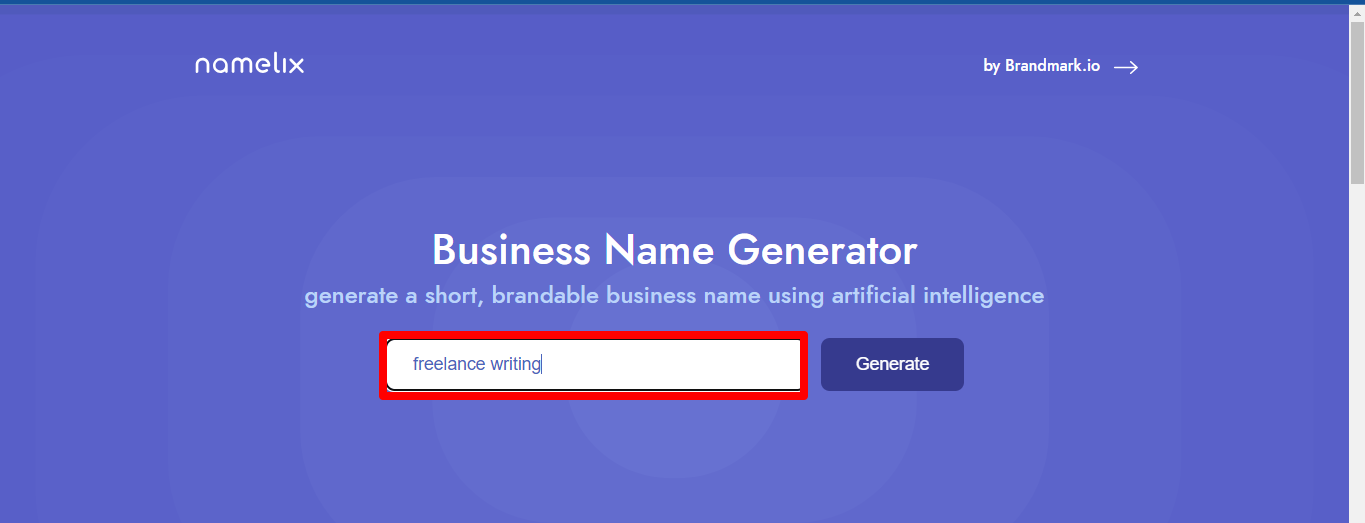
3. On the next page, you’re prompted to select a name style. Select Auto to give you various name styles. If, however, you want a specific style, select that style and click Next.
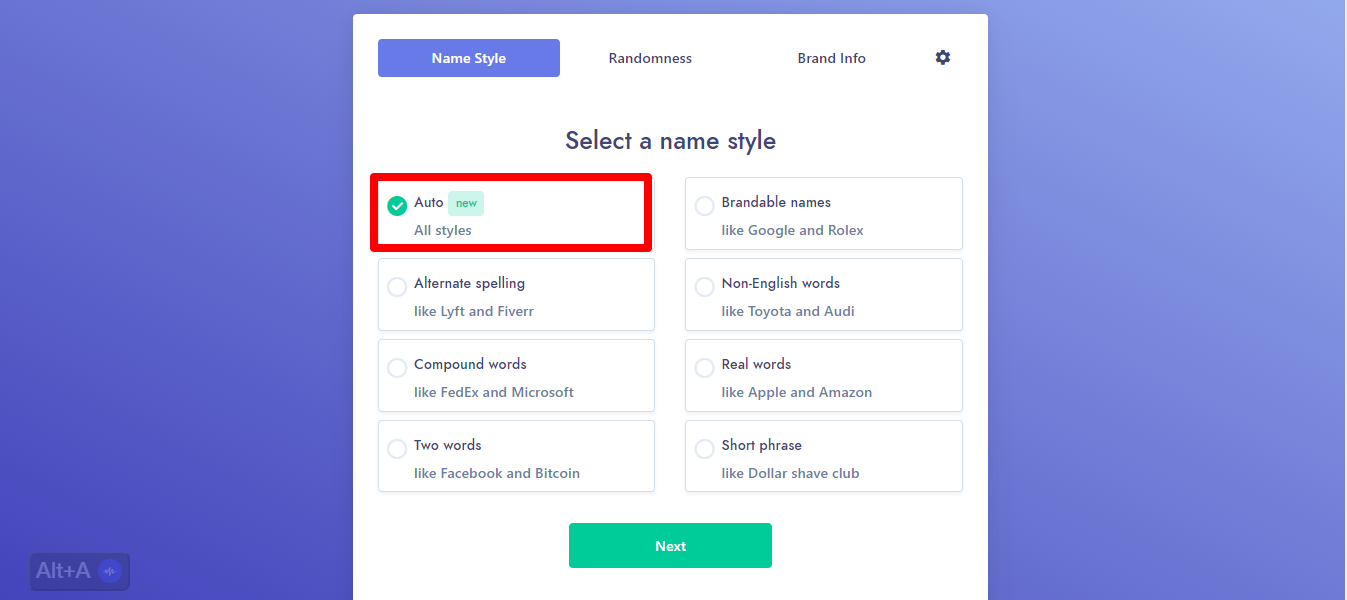
4. On the randomness page, select low, medium, or high depending on how random you want the name to be. A very random name may not have any of the words in freelance writing. For this example, we will select Medium.
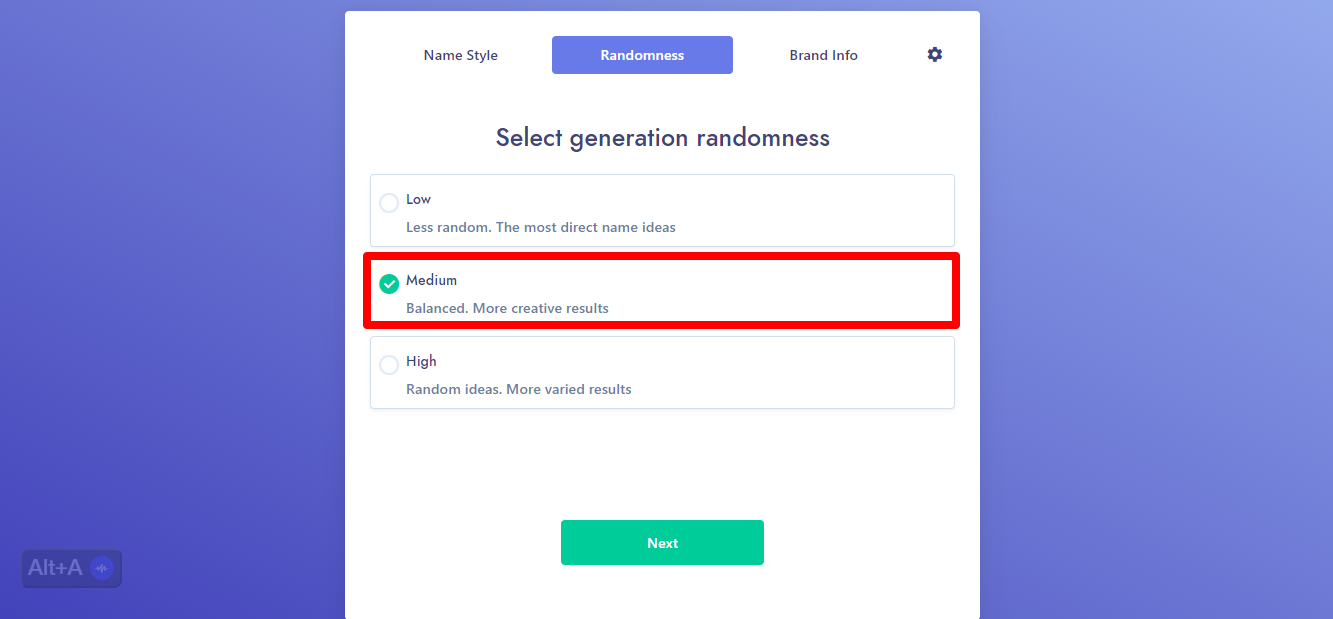
5. On the brand page, you may want to describe your business idea more to give the tool more context. Then make sure the Check Domains button is turned on. After that, click Generate.

6. From the results, pick the name that most appeals to you. Let’s select Writewave.

7. On the next page, you will verify if the domain name is available or not. For our Writewave example, the domain name is available even though it’s expensive.
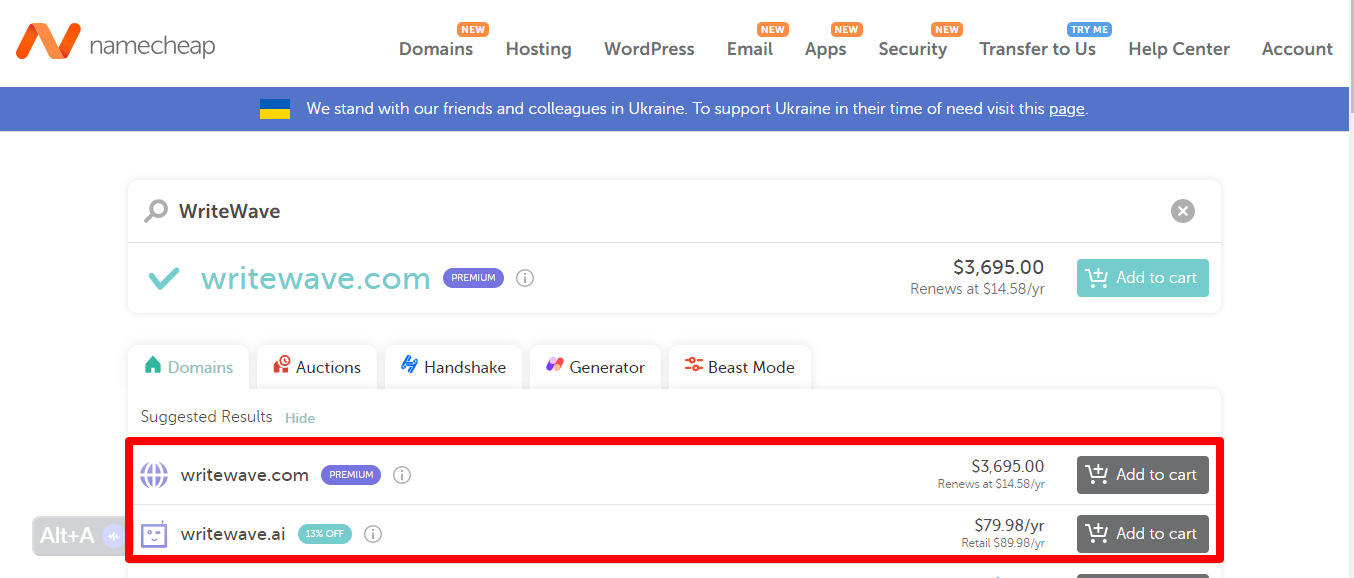
3. Check for name availability
Before checking name availability, gather and filter the names you already have in your notebook. That way you can eliminate the names you don’t like before checking for the name availability. Filtering out these names will save you the time of checking the availability of all the name ideas.
A name availability check is a step towards avoiding legal issues. It’s a way to verify that the name you intend to use is not already registered by someone else.
It helps you know if the business name you’re intending to use is available on the internet for creating your business’s website and social media accounts.
How to check for name availability
Checking for name availability should be done in three ways:
- On the Corporate Affairs Commission (CAC) registry
- On the world wide web for website domain name availability
- On social media for social media account availability.
I. Corporate Affairs Commission (CAC) registry name availability check
1. Visit the Corporate Affairs Commission (CAC) website. The website has a database of all registered businesses in Nigeria.
2. On the home page, find the Public Search bar and click on it.

3. The website prompts you to search for a business name on the CAC records. Type your chosen business name and click Search. Let’s search for the name Writewave from our freelance writing example.

4. On the search result page, you may get a Search Not Found result or a list of names. A “search not found” result means that no one has registered that name, and you can claim it. A list of names on the search result means that there are businesses with names related to your search. You will have to cross-check the list of names manually to ensure that no one is using your exact desired name. If someone is already using it, then you have to choose another name to avoid legal issues. Our example below shows a search not found result.

5. Before you finally conclude that your business name is available, there are 5 areas on the websites to check through. So, after you search for the name, check on the top part of the web page. You’ll see business name, company, incorporated trustees, limited partnership and limited partnership. Click on each of them to ensure your business name is available all through. That is only when you can be certain that your chosen business name is available. See the image below for clarity.
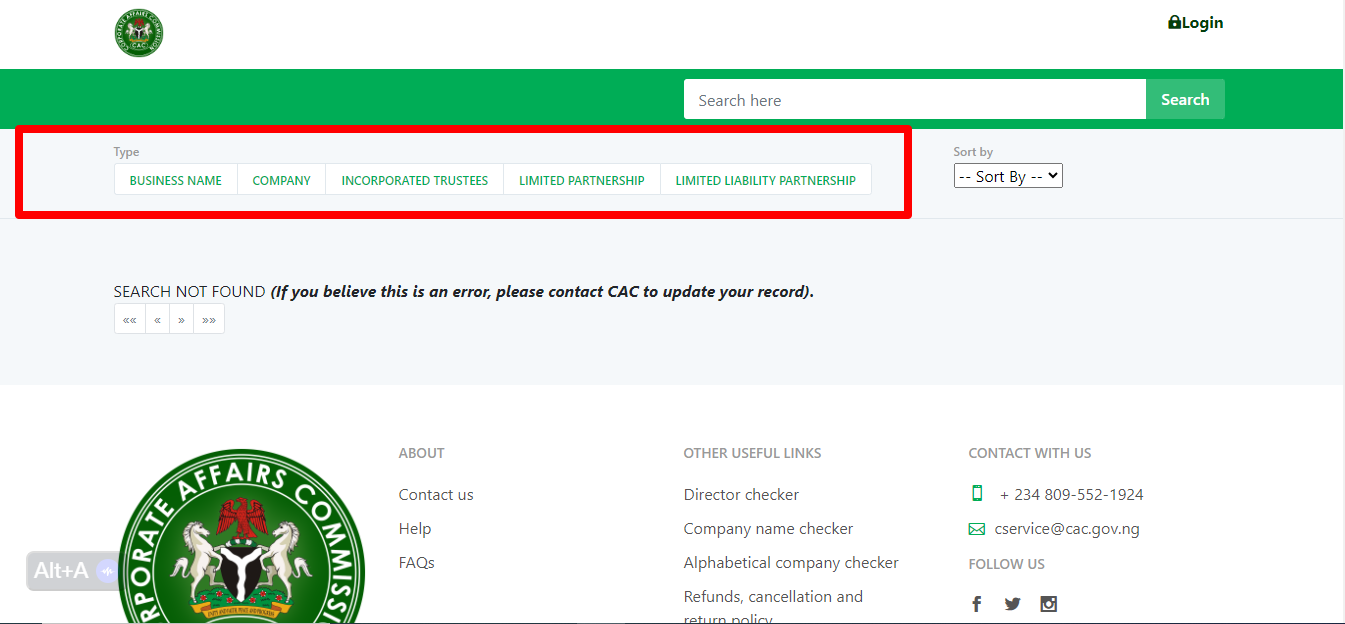
II. Checking for domain name availability
This is the simplest of the three checks. Here are the steps to follow:
1. Choose a domain registrar and visit the website. A domain registrar is a company or an organisation that helps you check the availability of a business name, buy it, and register it on the internet. There are so many domain registrars such as Namecheap, GoDaddy and Bluehost. However, we will be using Bluehost to illustrate this. So visit the Bluehost website.
2. On the homepage, you’ll find a search bar prompting you to type your desired domain. Type your chosen name and select the [dot]com option. Click search.

3. If your chosen name is available, Bluehost will notify you on the new page. From the image below, the name Swift Pickup is not available.
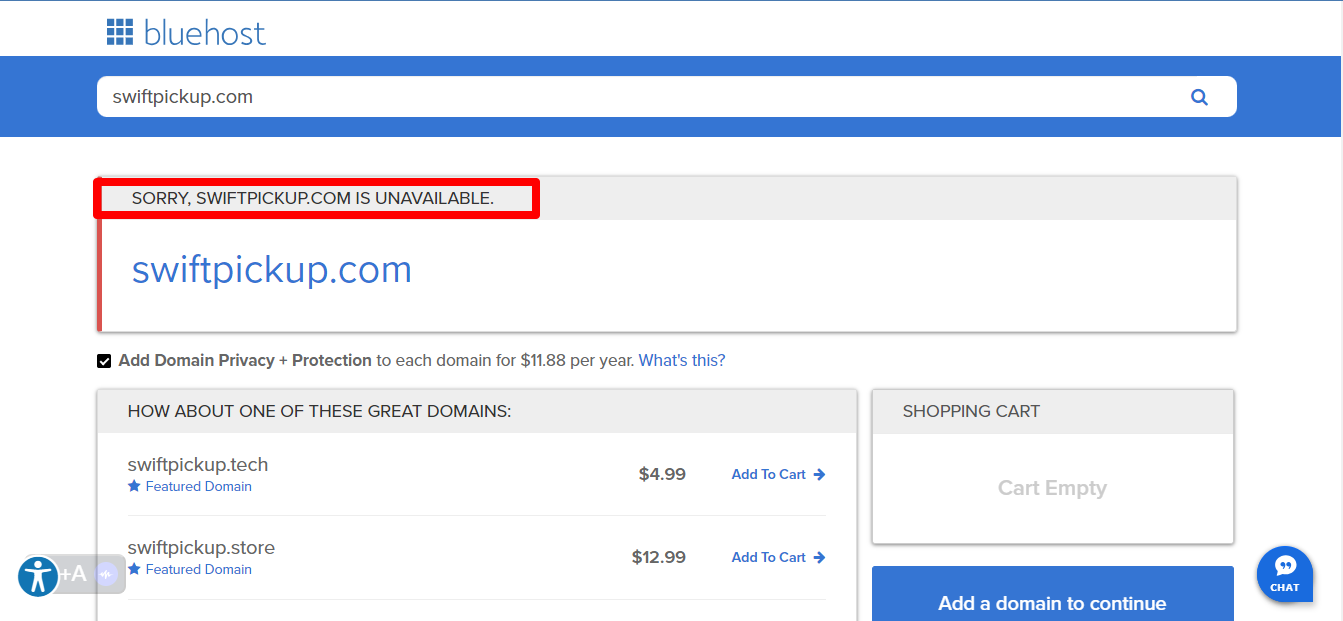
III. Checking for social media name availability
There are many social media sites today. To determine the social media to register for, find out where your customers are most likely to hang out. For example, if your business is photography, your customers are most likely to be on Instagram, Facebook, and LinkedIn.
But ideally, you should check and claim your business name on major social media platforms such as Facebook, Instagram, Twitter, LinkedIn, and Tiktok.
Let’s show you how to check for name availability using LinkedIn as an example:
- Visit the LinkedIn website and log in to your account or create a new account.
- Locate the search bar at the top part of the website, type in your desired business name, and click Search. Let’s use Swift Pickup for instance.

- Select the company filter and click search. If the name is available, you’ll find a list of names. Otherwise, you’ll get a no result found notification. This notification means that the name is available. The name Swift Pickup from our example is available for registration on LinkedIn.
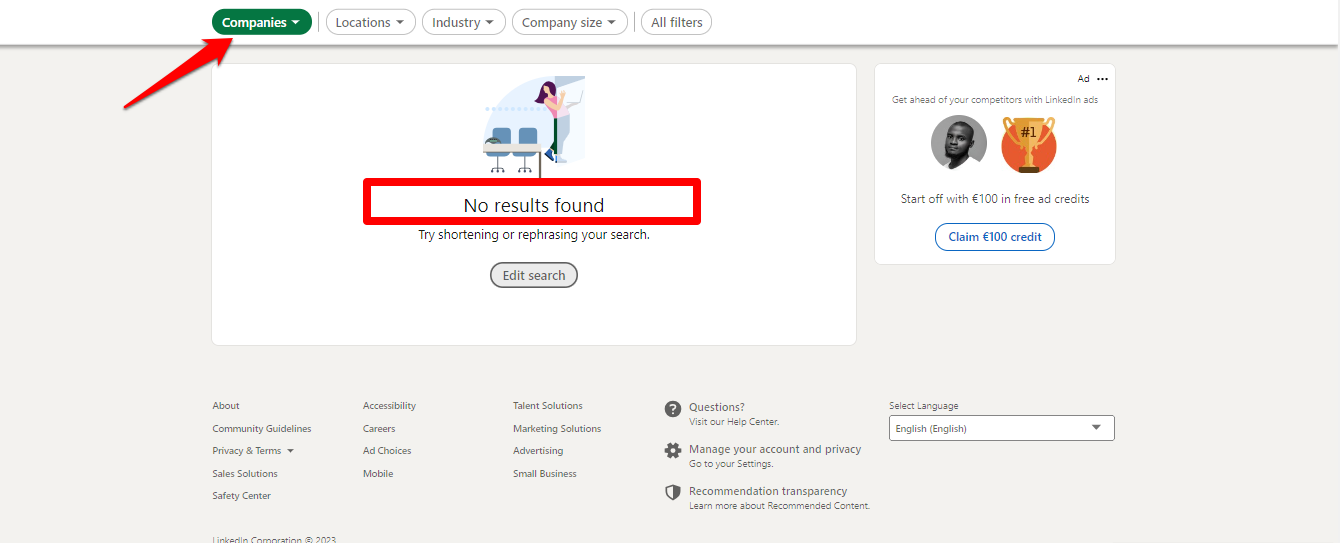
4. Test the name by talking to family and friends
Sometimes, your mind can be deceptive. You may choose a business name believing everyone will love it, but you can’t be sure unless you ask someone else. That’s where your family and friends come in. Testing your desired business with them will help you:
1. Get sincere feedback: People close to you will most likely tell you the truth. If the name works, they’ll let you know. If it doesn’t resonate with them, they’ll still find a way to tell without hurting your ego.
2. See a fresh perspective: Your family and friends may suggest different ideas, angles, and insights you never thought of.
3. Get a fraction of your audience’s perception: Your family and friends may be part of your target customers. The feedback they give you will help determine how your overall audience will perceive the name.

How to test the name by talking to family and friends
Here are 6 steps to follow to test your business name with family and friends.
1. Start by compiling a list of desired names you have confirmed their availability.
2. Give your family and friends an overview of your business by explaining your mission, values, products, services, and target audience. This will help them give you good feedback.
3. Take the names one after the other, pronounce them, write them on paper, or do both to see their reactions.
4. Observe the emotional reaction on their faces as you pronounce the names. Take notes for adjustments.
5. Request their honest feedback. Let them know how much it matters to the future of your business. Ask them specific questions, such as what the name makes them think of, the alignment of the name with your brand values, how easy it is to pronounce and remember, etc. Take notes all the way.
6. After you’ve noted their feedback, analyse it to know the suggestions that are repetitive and evaluate how the feedback aligns with your inclination to make a final decision.
5. Check for trademarks
You may have seen these symbols ™, SM, and ® countless times. They’re signs that businesses using them are trademarked.
According to the U.S. Patent and Trademark Office, “a trademark can be any word, phrase, symbol, design, or a combination of these things that identifies your goods or services. It’s how customers recognize you in the marketplace and distinguish you from your competitors.”
TM is used for product-based businesses like garri processing business, while SM is for service-based businesses like public transport business. ® shows that a trademark has been registered with the trademark authority of a particular country. In Nigeria, the Trademarks, Patents, and Designs Registry under the Ministry of Industry Trades and Investments Commercial Law Department is responsible for registering trademarks.
Why you need to check for trademarks
There are 3 main reasons why you need to check for trademarks before finally choosing a particular business name. They include:
1. To avoid legal issues of trademark infringement: There are consequences if you go ahead to use a business name you choose without verifying for trademark. You may be stopped from using the business name by a court and fined for damages.
2. To save the cost of rebranding: Imagine going ahead to design your company logos and creating branded materials for marketing only to find out that the name you’re using is legally owned by someone else. That will amount to dropping the name and losing all the time and resources you have spent.

How to check for trademarks
You need to contact an accredited lawyer or agent in Nigeria if you want to check for trademarks.
Here are the requirements you’ll provide for the agent for a smooth trademark check on your desired business name:
- The word(s) and logo you want to trademark
- Your full name
- Your address
- Your phone number and email address.
6. Confirm compliance with local laws and regulations
For any business you plan to start, there are various local laws and regulations guiding name choice. Here are the 2 local laws and regulations guiding business name choice in Nigeria:
1. Companies and Allied Matters Act (CAMA) 2020: The Companies and Allied Matters Act is the official law that oversees the formation, regulation, and management of companies and businesses in Nigeria. It states the rules and regulations guiding the choice of business names in Nigeria, while the Corporate Affairs Commission (CAC) regulates business name choices following the provision of this Act. CAC also ensures that prohibited and restricted names are not registered.
2. Nigerian Trademarks, Patents, and Designs Registry regulations: The Trademarks, Patents, and Designs Registry in Nigeria has rules and regulations that oversee trademarking in Nigeria. That’s why you have to undergo a name search in their database with the help of an accredited user before your business name is approved. If a name or logo you choose is similar to an existing trademark, you’ll not get approval after the name search.
You should ensure the name you’re choosing complies with local laws for 3 reasons:
- To avoid legal issues with competitors: Assuming you unlawfully use someone’s trademark, they’ll sue you for damages. This may attract fines and penalties to your business.
- To ensure the continuity of your business: If you start a business without complying with Nigerian regulations, the government may likely terminate your business. This can cause you to lose money.
- To strengthen your business reputation among your customers and clients: If your business is not registered, it may be difficult for customers to trust you. Complying with local laws and regulations helps you establish your business as trustworthy and reliable.
How to confirm compliance with local laws and regulations
- To observe compliance with the Companies and Allied Matters Act 2020 (CAMA 2020) as regards business name choice, visit the CAC website for a public name search. CAC follows the CAMA 2020 guidelines to accept, reject, and cross-check the names you provide. As you conduct the name search using the public search option on the website, read through all the instructions carefully to know what is expected of you. Refer to step 2 for a step-by-step process on using the CAC website for a name search.
- To observe compliance with the Nigerian Trademarks, Patents, and Designs Registry regulations, go through an accredited lawyer or agent to help you do a name search using your proposed business names. But generally, what you need for compliance with this institution includes your desired business names and your proposed business logo. You may also check out this excerpt from CAMA 2020 to see prohibited business names and companies in Nigeria.
Best practices for choosing a business name
Let’s consider some best practices you should observe in choosing the perfect name for your business.
1. Identify your brand’s values and have them in mind
Business values are qualities that are dear and matter to your business the most. You can see it as good qualities you want your business to be known for.
For example, if you run an Esusu business, the values to uphold include trustworthiness and reliability since people are entrusting you with their money.
Identifying your brand’s value is important for several reasons:
- To align them with your overall business goals: For example, a studio that is constantly available for services can go by the name Studio24.
- To stand out from your competitors
- To attract the target customers: If your business suggests what you do, it’s more likely to attract the right customers. For example, people will most likely consider a clothing boutique with the name Quality-Time Clothing simply because of the word quality.
2. Avoid hard-to-spell names
There is a difference between a hard-to-spell name and a unique name. That’s where most business owners get it wrong.
A unique name stands out without confusing your customers. To create uniqueness, some business owners tend to spell a name the way it is pronounced. Think of a name like XplicitNG which should be spelt ExplicitNG. This makes the name complicated. In fact, a study by Sage Journals reports that customers are less likely to support brands whose names are misspelt because they seem desperate for attention.
Hard-to-spell names are a pain for customers to remember. You shouldn’t stress your customers so that they can easily refer you to other people.
Hard-to-spell names are also difficult to find online. For example, imagine that you tell someone your business name is Flicker by mouth, and they later decide to find you online. They will most likely type Flicker.com on Google, although your business domain name is Flickr.com. That’s an easy way for you to lose that potential customer to someone else.
Names like XplicitNG, Xiaomi, Huobi, and Flickr are examples of hard-to-spell business names.
3. Keep it short and memorable
Remember your nursery school days when you were taught the two- and three-letter word spelling? Your teachers knew it would be easier for you at that tender age to remember short words. You should use this same mindset in choosing your business name.
Customers will remember your business name faster if it’s short. According to Harvard Business Review, investors will like your company better if you shorten your business name. Existing customers will also find it easy to refer others to your business since they’ll easily remember it.
Maggi, Peak, Cowbell, and Showmax are examples of short and memorable business names.
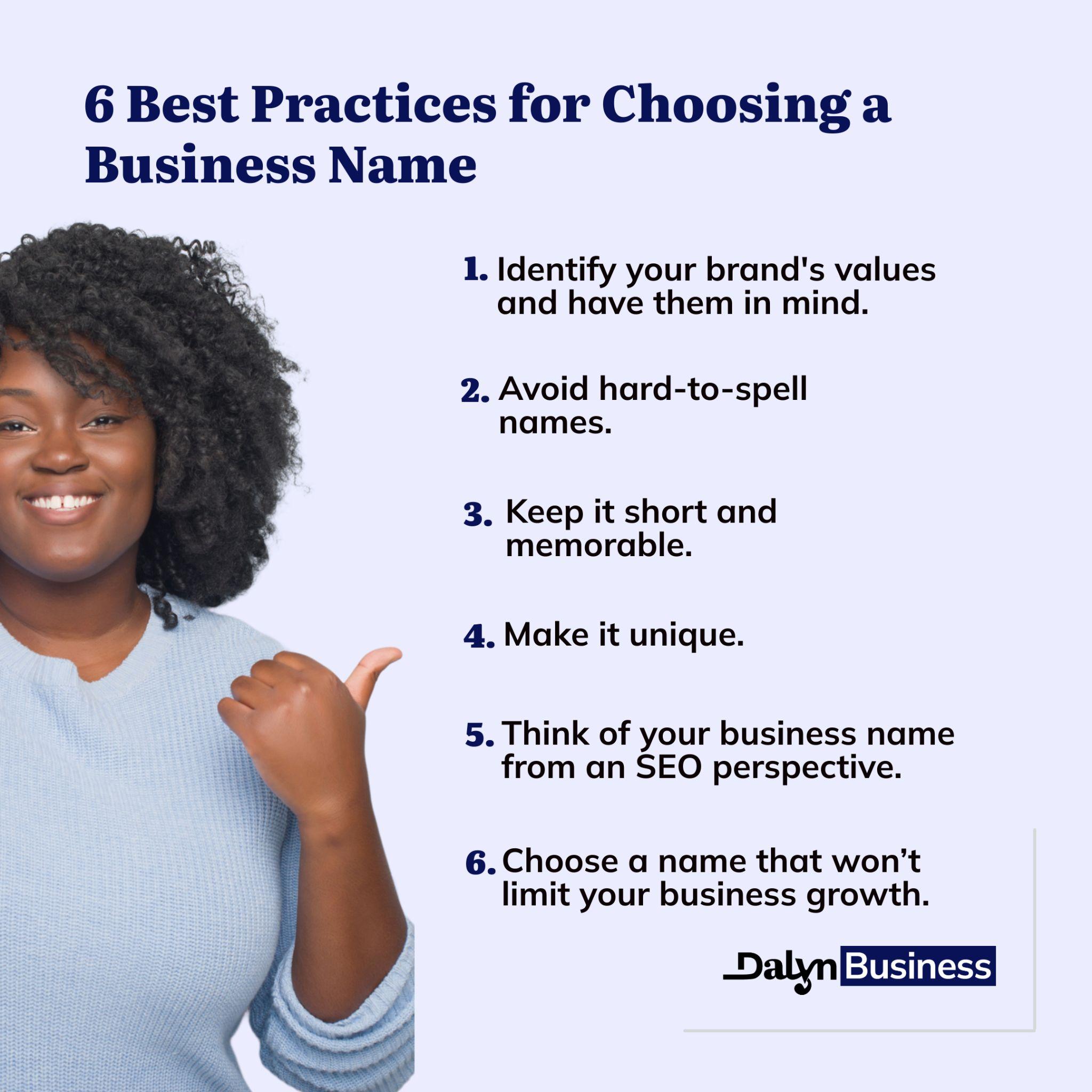
4. Make it unique
With more than 300 million companies in the world today, having a unique business name is crucial. A unique business name is original, stands out of other names, and often involves wordplay. An example of a unique business name in Nigeria is Wazobia—a combination of Yoruba (Wa), Hausa (zo), and Igbo (bia) words for come.
Here are 3 benefits of having a unique business name:
- Your business stands out from competitors and becomes easy to recognise and remember.
- A unique business name has a more readily available domain name that you can easily buy.
- A unique business name is easier to trademark since it has a high chance of not being registered by someone else.
5. Think of your business name from an SEO perspective
SEO stands for search engine optimization. It’s a way of fine-tuning your website content to be easily recognised by search engines like Google and Bing. SEO-focused business names have one or two words relating to their industry as part of their business name. Sabi Writers is an example of a writing agency that’s SEO-focused. Notice the writers in the name.
As more businesses go online, it’s harder to stand out due to fierce competition. Niel Patel, a top digital marketer, says: “With a business name that’s friendly to your target keywords, you’ll easily be top of the results. But with one that isn’t, you’ll be on page 15, 50, or 100.”
So, having an SEO-focused business name is a step towards being noticed and picked up by search engines when people search for terms related to your business.
6. Choose a name that won’t limit you as your business grows
A limiting business name is centred around a small idea or industry. Although niching down is very important in business, limiting business names can prevent you from growing, diversifying, and expanding your business.
Assuming you run a cake-making business and hope to diversify your business in the future, Jessy Cakes is an example of a limiting business name. You may consider Jessy Confectioneries to cover other products like biscuits, and chocolates which are related to baking.
Conclusion
Choosing the right business name while starting your business is something to keep in mind. With the right business name, your business stands out from competitors and customers can easily refer people to you and effortlessly find you online. In addition, you’ll have the freedom to scale or sell your business in the future without your business name limiting you.
With this guide, you’re sure to choose the right name for your business.


